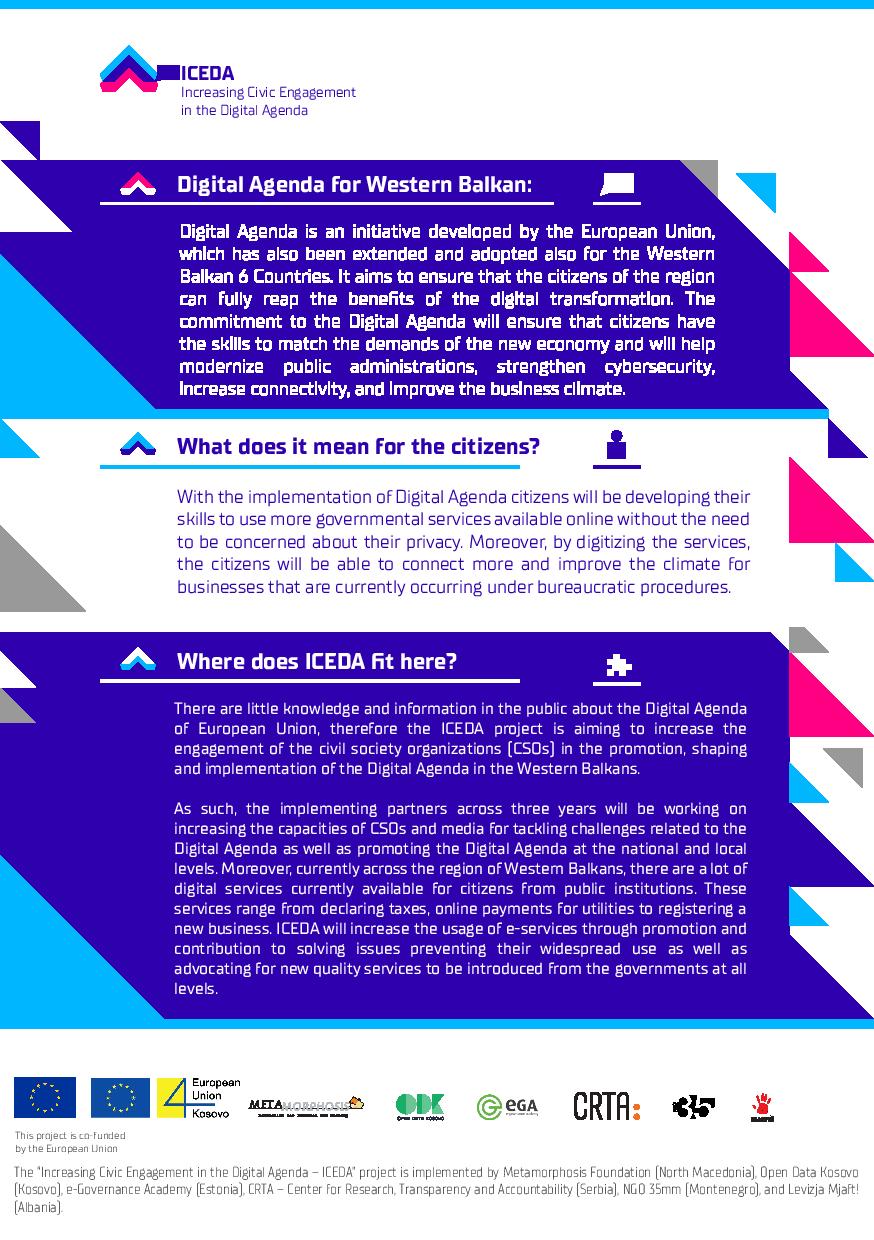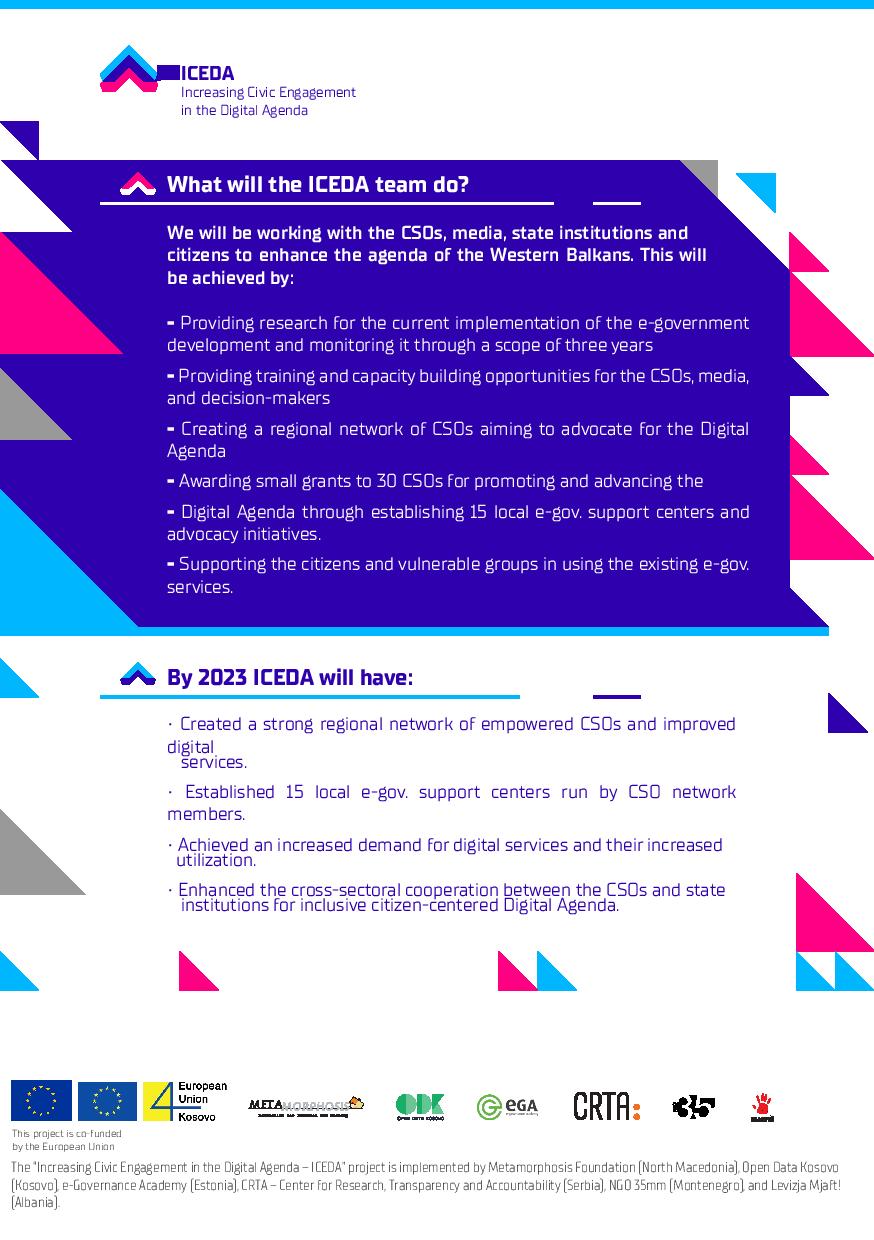News

Digital Agenda for Western Balkan, an initiative developed by the European Union
POSTED ON: 13 July 2020
PROJECT NAME: Digital Agenda for Western Balkan, an initiative developed by the European Union
Digital Agenda is an initiative developed by the European Union, which has also been extended and adopted also for the Western Balkan 6 Countries. It aims to ensure that the citizens of the region can fully reap the benefits of the digital transformation. The commitment to the Digital Agenda will ensure tha ...
Digital Agenda is an initiative developed by the European Union, which has also been extended and adopted also for the Western Balkan 6 Countries. It aims to ensure that the citizens of the region can fully reap the benefits of the digital transformation. The commitment to the Digital Agenda will ensure that citizens have the skills to match the demands of the new economy and will help modernize public administrations, strengthen cybersecurity, increase connectivity, and improve the business climate.
With the implementation of Digital Agenda citizens will be developing their skills to use more governmental services available online without the need to be concerned about their privacy. Moreover, by digitizing the services, the citizens will be able to connect more and improve the climate for businesses that are currently occurring under bureaucratic procedures.
There are little knowledge and information in the public about the Digital Agenda of European Union, therefore the ICEDA project is aiming to increase the engagement of the civil society organizations (CSOs) in the promotion, shaping and implementation of the Digital Agenda in the Western Balkans.
As such, the implementing partners across three years will be working on increasing the capacities of CSOs and media for tackling challenges related to the Digital Agenda as well as promoting the Digital Agenda at the national and local levels. Moreover, currently across the region of Western Balkans, there are a lot of digital services currently available for citizens from public institutions. These services range from declaring taxes, online payments for utilities to registering a new business. ICEDA will increase the usage of e-services through promotion and contribution to solving issues preventing their widespread use as well as advocating for new quality services to be introduced from the governments at all levels.
Find below more information in regards to this project:
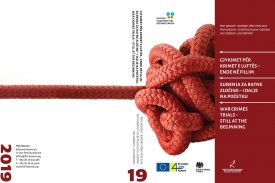
HLCK Published Latest Online Report on Trials Monitoring in 2019
POSTED ON: 26 May 2020
PROJECT NAME: HLCK Published Latest Online Report on Trials Monitoring in 2019
Within regular activities in Project Monitoring Conflict-Related Trials in Kosovo and Youth Access to Justice, Humanitarian Law Center in Kosovo (HLCK) publishes the report on the most significant trials monitored during the past year 2019, titled “War Crimes Trials - Still at the Beginning”. The repor ...
Within regular activities in Project Monitoring Conflict-Related Trials in Kosovo and Youth Access to Justice, Humanitarian Law Center in Kosovo (HLCK) publishes the report on the most significant trials monitored during the past year 2019, titled “War Crimes Trials – Still at the Beginning”.
The report includes analysis of trials monitored by the HLCK monitors during 2019. In addition, results achieved by judicial institutions in prosecuting war crimes were presented. Finally, recommendations were given to judicial institutions in order to overcome issues currently faced by Kosovo judiciary as successfully as possible, and achieve best possible results in the coming period.
This report includes 19 cases, in all stages of criminal procedure. Pretrial procedure was initiated against eight (8) persons who were arrested during the year due to reasonable doubt that they had committed war crime against civilian population. They were mainly arrested at border crossings, when entering the territory of Kosovo. On this occasion, they were ordered detention and investigations were also initiated against them. In relation to two (2) arrested persons, and after obtaining evidence, investigations were suspended and they were released from detention. In relation to four (4) suspects, late in the year, three (3) indictments were filed, while investigative procedure continued in relation to the remaining two (2)
Two (2) main trials initiated in previous years continued in relation to war crimes charges in the reporting period. The report includes published analysis of appeals procedures in relation to these charges, as well certain cases connected with war crimes cases, with political or ethnic background.
You may find more details on these and other observations that, according to the HLCK, marked Kosovo judiciary in 2019, in the online version of yearly report “War Crimes Trials – Still at the Beginning”.
Find here the report: “War Crimes Trials – Still at the Beginning”.
The Project “Monitoring Conflict Related Crime Trails in Kosovo and the Inclusion of the Youth in the Justice Sector” is funded by the Foreign and Commonwealth Office through the British Embassy in Pristina and the European Union in Kosovo through the project “Transforming conflicting perceptions through increased civic and community engagement in Kosovo”.
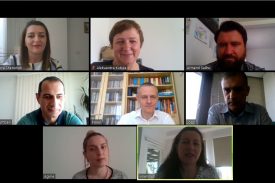
Teleconference Prishtina – Warsaw – Lisbon | EU-funded twinning project at the Kosovo National Audit Office (KNAO)
POSTED ON: 28 April 2020
PROJECT NAME: Teleconference Prishtina – Warsaw – Lisbon | EU-funded twinning project at the Kosovo National Audit Office (KNAO)
At the time of the global pandemic we are going on with our international cooperation. Within the EU-funded twinning project at the Kosovo National Audit Office (KNAO), a teleconference Prishtina – Warsaw - Lisbon is being held on 28 April 2020 to discuss a draft KNAO audit report. The report is going ...
At the time of the global pandemic we are going on with our international cooperation.
Within the EU-funded twinning project at the Kosovo National Audit Office (KNAO), a teleconference Prishtina – Warsaw – Lisbon is being held on 28 April 2020 to discuss a draft KNAO audit report. The report is going to be published soon and is dedicated to the management of IT systems at one of the central institutions of Kosovo.
Within the twinning project two pilot IT audits have been carried out by Kosovo auditors with assistance from their Polish and Portuguese colleagues.
Auditing IT systems is becoming more and more crucial in the work of Supreme Audit Institutions (SAIs) all over the world, as the states rely to an ever greater degree on how effectively its institutions are able to use IT to provide its various services and function. IT has become practically omnipresent over the last decades.
It is therefore crucial for institutions like the Kosovo National Audit Office to have the needed capacities and resources, and be able to carry out effective audits in that area and to provide the Parliament, the government and the public with useful and reliable conclusions and recommendations.
This is why one of the topics of today’s meeting, except for the IT-related subject matter, is how to present audit conclusions and recommendations in an effective way, so that they can be easy to understand, and thus also easier to implement and follow up.
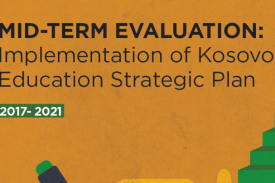
Implementation of Kosovo Education Strategic Plan
POSTED ON: 5 February 2020
PROJECT NAME: Kosovo Education for Employment Network (KEEN)
The report presents a summary of monitoring results of KESP implementation between 2017 - 2019. It provides a detailed assessment of the implementation of activities, measures foreseen, achievement of indicators defined and consequently accomplishment of strategic objectives. Full report: Implementation of K ...
The report presents a summary of monitoring results of KESP implementation between 2017 – 2019. It provides a detailed assessment of the implementation of activities, measures foreseen, achievement of indicators defined and consequently accomplishment of strategic objectives.
Full report: Implementation of Kosovo Education Strategic Plan
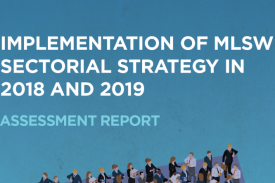
Implementation of MLSW Sectorial Strategy in 2018 and 2019
POSTED ON: 5 February 2020
PROJECT NAME: Kosovo Education for Employment Network (KEEN)
The Labour and Social Welfare Strategy (LSWS) is a sector strategy that sets out concrete steps for implementation in the period 2018-2022 by state institutions in the field of employment and social welfare. Full report: Implementation of MLSW Sectorial Strategy in 2018 and 2019 ...
The Labour and Social Welfare Strategy (LSWS) is a sector strategy that sets out concrete steps for implementation in the period 2018-2022 by state institutions in the field of employment and social welfare.
Full report: Implementation of MLSW Sectorial Strategy in 2018 and 2019
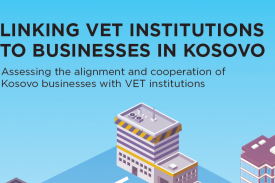
Linking VET institutions to businesses in Kosovo
POSTED ON: 5 February 2020
PROJECT NAME: Kosovo Education for Employment Network (KEEN)
This report presents the findings from the study “Linking Vocational Education and Training (VET) institutions to businesses in Kosovo”. The main purpose of the study is to better understand the level of cooperation between VET schools and businesses in Kosovo. Full report: Linking VET institutions to ...
This report presents the findings from the study “Linking Vocational Education and Training (VET) institutions to businesses in Kosovo”. The main purpose of the study is to better understand the level of cooperation between VET schools and businesses in Kosovo.
Full report: Linking VET institutions to businesses in Kosovo
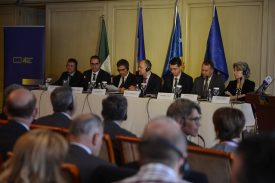
Strengthening Efficiency, Accountability and Transparency of the Judicial and Prosecutorial System in Kosovo
POSTED ON: 26 September 2019
PROJECT NAME: Strengthening Efficiency, Accountability and Transparency of the Judicial and Prosecutorial System in Kosovo
The “Strengthening Efficiency, Accountability and Transparency of the Judicial and Prosecutorial System in Kosovo” has published end-of-project report in three languages: English, Albanian and Serbian. The projects implementing partners are: - Italian High Council of the Judiciary (Consiglio Superio ...
The “Strengthening Efficiency, Accountability and Transparency of the Judicial and Prosecutorial System in Kosovo” has published end-of-project report in three languages: English, Albanian and Serbian.
The projects implementing partners are:
– Italian High Council of the Judiciary (Consiglio Superiore della Magistratura – CSM) in cooperation with the Italian Ministry of Justice (Ministero della Giustizia), and
– French Ministry of Justice (Ministère de la Justice)
Beneficiaries:
– Kosovo Judicial Council (KJC)
– Kosovo Prosecutorial Council (KPC)
– Special Prosecution Office of Republic of Kosovo (SPRK)
The duration of the project was 31 months (from 10 October 2016 to 9 May 2019)
with a budget: 2.9 million EUR.
Overall objectives of the Project were to contribute to the Rule of Law in
Kosovo by strengthening the independence, efficiency, quality and
accountability of Judiciary and Prosecutorial system.
Specific objectives were to increase the efficiency, transparency and
sustainability of the Judicial and Prosecutorial system by improving the
planning and implementation of Judicial/Prosecutorial reforms and
enhancing the effectiveness of Judicial and Prosecutorial Councils,
including the Special Prosecution Office of Republic of Kosovo.
Please see more details in the report by clicking Here
FLICKR Photo’s:
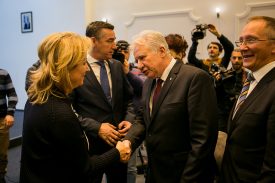
Evaluation of the EU funded support to the Kosovo Assembly September 2018 –December 2018
POSTED ON: 8 March 2019
PROJECT NAME: Evaluation of the EU funded support to the Kosovo Assembly September 2018 –December 2018
The European Union has been providing substantial assistance to the Assembly of Kosovo since 2006. Since 2008, the Assembly was supported by three Twinning projects for a total value of 3.05 Million Euro, implemented between 2011 and 2018. The main objective of these three projects were:1. To improve the leg ...
2. To strengthen management practices in the Assembly, on the financial and budgetary, the human resources and the ICT system management;
3. To strengthen the oversight function of the Assembly of the plenary session and the committees;
4. To prepare for EU integration; and,
5. To provide administrative support to MPs related to tasks of the European integration process.Before preparation of the new support to the Assembly, the EU Office in Kosovo launched an independent evaluation of these three Twinning projects in October 2018. Conclusions of the evaluation include findings regarding relevance, efficiency, effectiveness, impact, sustainability, EU-added value and coherence of the three Twinning projects.This evaluation presents a very useful tool for planning the future support to the Assembly.
Please see more details in the report in the link below:
Action Plan for the Kosovo Assembly (English Only)
FLICKR Photo’s:
Opening Ceremony of the twinning project: Further Support to Kosovo Assembly
Twinning project: Supporting the Kosovo Assembly – closing event 21 Feb 2018

“STIGMA – Claim your Right”
POSTED ON: 22 February 2019
PROJECT NAME: Protecting and Promoting Human Rights in Kosovo Through Active Civil Society
Sexual violence committed during the war in Kosovo continues to remain an open wound in the hearts of our society. It is a sensitive topic, that exemplifies human rights abuses and belated institutional response to those that are most in need. Survivors continue to face judgement, bias, shame, and until very ...
Sexual violence committed during the war in Kosovo continues to remain an open wound in the hearts of our society. It is a sensitive topic, that exemplifies human rights abuses and belated institutional response to those that are most in need. Survivors continue to face judgement, bias, shame, and until very recently, lack of institutional support.
Within the EU funded project “Promoting and Protecting Human Rights in Kosovo”, the forum theater play “Stigma: Claim Your Right” was delivered across the country. “Stigma” directly deals with this heartbreaking, collective trauma. The performance directly targets discrimination and bias towards survivors of sexual violence. However, the special feature of the Theatre Forum is the live interaction between actors and audience whereby the audience can ask questions throughout the performance, obtain new information, and challenge the (often discriminatory) views of the actors.
This play has challenged the current mentality and attitudes towards survivors of sexual violence, and managed to promote a revolting spirit, which was most noticeable during the live interactive discussions between the audience and actors. Among others, the play used its attention to raise awareness on the mandate and commitment of the Ombudsperson Institution by actively speaking about its mandate, focus, and responsibilities.
It was a performance that brought together institutional representatives, representatives from civil society, students and pupils and random citizens, all of whom believe in human rights and an equal society for all. Most importantly, following the screenings of the play, the Ombudsperson Institution began to receive requests and inquiries by survivors of sexual violence during the war, on state reparations and how to obtain them.
The play premiered in October 2017 in the Women’s Correctional Facility in Lipjan, where the play was offered in front of women prisoners who had the opportunity to discuss on human rights abuses and the role of the Ombudsperson. The play was then held 6 more times in 2017 throughout Kosovo, as well as 6 further times in 2018 due to popular demand.
Approximately 2000 people have already viewed the play and participated in its interactive discussions; 60% of all participants were women and girls, while 40% were men and young men. Ultimately, the play has achieved to challenge commonly held discriminatory and judgmental beliefs towards victims of sexual violence during the war in Kosovo.
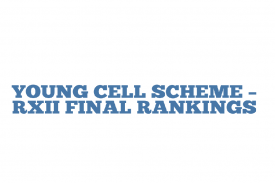
YCS Round XII: Final Rankings – Lists of Grantees and Reserves
POSTED ON: 4 February 2019
PROJECT NAME: EU Scholarship Scheme
The YCS interviews for Round XII selections were held on Monday, 28th January, Tuesday, 29th January, Wednesday, 30th January, Thursday 31st January and Friday, 1st February 2019 at the British Council’s premises in Pristina. In total 84 candidates were invited to take the interviews and 81 candidates we ...
The YCS interviews for Round XII selections were held on Monday, 28th January, Tuesday, 29th January, Wednesday, 30th January, Thursday 31st January and Friday, 1st February 2019 at the British Council’s premises in Pristina.
In total 84 candidates were invited to take the interviews and 81 candidates were interviewed. One (1) candidate (in Law sector) did not show on the day of the interview. In addition, two (2) candidates (both in Culture and Health sector) did not take the interview which was scheduled on Friday, 1st February: one (1) candidate decided to withdraw from the selection for personal reasons after registering for the interview; one (1) candidate was excluded from the selection and declared as inadmissible by the interview panel as she failed to produce the necessary documentary evidence for her degree.
Out of the 81 interviewed, a total of 40 grants were awarded and 8 candidates were retained as reserves (all grantees and reserves will receive a separate e-mail detailing the rights and obligations related with their status). In total, 22 men and 26 women were awarded with a scholarship or retained as reserves.
For each sector, the following decisions were taken by the Panel Members, inclusive of the YCS Scholarship’s stakeholders (the EU Office and the Ministry of European Integration):
- for Law 16 grants were awarded, and 3 applicants were retained as reserve;
- for Public Administration 10 grants were awarded, and 2 applicants were retained as reserve;
- for Economics 10 grants were awarded, and 2 applicants were retained as reserve;
- for Culture and Health 4 grants were awarded, and 1 applicant was retained as reserve.
The RESULTS of the INTERVIEWS, with scores of all candidates, and the FINAL RANKING for EACH SECTOR, can be downloaded by clicking THE FOLLOWING LINKS:
YCSXII_FINAL RESULTS LAW (Download)
YCSXII_FINAL RESULTS PA (Download)
YCSXII_FINAL RESULTS ECO (Download)
YCSXII_FINAL RESULTS CH (Download)
All candidates who took the interview and who were not awarded a grant can come to the YCS Secretariat office at the British Council premises in Pristina to be shown the “consensus minutes” drafted by the Interview Panel relating to their own interview, and to receive a specific feedback on their performance during the interview on one of the following days:
– Tuesday, 5th February 2019 from 10:00 to 16:00
– Wednesday, 6th February 2019 from 10:00 to 16:00

Cogeneration project: increasing heat supply and decreasing CO2 emission
POSTED ON: 13 November 2018
PROJECT NAME: Cogeneration project: increasing heat supply and decreasing CO2 emission
The EU-funded Cogeneration project is a step in the right direction to provide with the much-needed heat supply to Kosovo citizens during the winter. This was the conclusion of the panelists agreed on during the discussion Energy Efficiency – Cogeneration and City Heating in Pristina. The discussion was org ...
The EU-funded Cogeneration project is a step in the right direction to provide with the much-needed heat supply to Kosovo citizens during the winter. This was the conclusion of the panelists agreed on during the discussion Energy Efficiency – Cogeneration and City Heating in Pristina. The discussion was organized as part of the Environment campaign #GIVEGREENACHANCE, funded by the EU Office.
The participants of the event had the opportunity to learn more about the importance of efficient energy, and exchange ideas and information about the improvement of the environment in Kosovo. The Cogeneration project is a tangible example of a long-term solution to the challenges Kosovo faces regarding the energy efficiency. With a €13.8 million investment, the EU aimed to improve the district heating in Pristina, and by doing so reduce CO2 emission in Kosovo. Through the construction of a pipeline connection between the Termokos heating network in Pristina and the Kosovo B Power plant, this goal has now become reality.
Libor CHLAD, Deputy Head of Cooperation, EU Office in Kosovo/EUSR, outlined the positive outcomes the project has on the citizens of Pristina. Not only will the air become less polluted, also 12.000 households and 60.000 people will feel the benefits of this project and have a 24-hour heat supply. Yet, according to CHLAD, the energy sector in Kosovo is still facing significant challenges; the energy intensity is approximately four times higher as the EU- average; and the energy sector remains one of the largest polluters in Kosovo. That is why CHLAD is calling for a nationwide debate on how to set up the energy supply and sector in Kosovo. “Look inside Kosovo for energy sources, and use the available new technologies”, CHLAD added.
Shpend Ahmeti, Mayor of Prishtina, was on the same page as Chlad and the other panellists. He called the Cogeneration project “a privilege to have” but was already looking to future improvements. “Kosovo has to decrease the use of wood and coal as energy sources, and more citizens have to become connected to the district heating,” Ahmeti stated. That is why Kosovo together with the EU, now focusses on establishing district heating nationwide in Kosovo. With an additional €19 million under IPA 2015, the EU will support these future engagements and improve the environment in Kosovo.
So, let’s give Green a chance, and continue to increase to heat supply and make improvements to protect the environment in Kosovo.
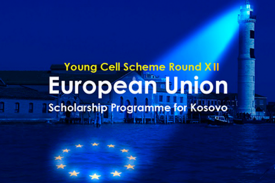
Young Cell Scheme, Post-Graduate EU Scholarship Programme 2018-2019
POSTED ON: 5 November 2018
PROJECT NAME: EU Scholarship Scheme
The European Union Office in Kosovo and the Ministry of European Integration, announce the forthcoming opening of the 12th Round of applications to the Young Cell Scheme, the EU post-graduate scholarships programme for Kosovo, which is currently implemented by the British Council. Applications will be open ...
The European Union Office in Kosovo and the Ministry of European Integration, announce the forthcoming opening of the 12th Round of applications to the Young Cell Scheme, the EU post-graduate scholarships programme for Kosovo, which is currently implemented by the British Council. Applications will be open from 12th November and until 3rd December 2018.Successful applicants will be offered the opportunity to study in a one year Master programme at Universities in EU Member States. The Scholarship Programme, which working language is only English, will offer up to 40 full grants, up to 10% of these grants are reserved for civil servants already employed in public administration (the actual number of grants awarded may vary depending on suitability of candidates and availability of funding). This call is open to graduates in Law, Political Sciences, Economics, Business Management, Social Sciences, History, Humanities, International Relations, Diplomacy, Criminology and other academic backgrounds (as specified in the Rules of Procedures to be published on 12th November 2018) in line with the following sectors of specialisation:
– Law (up to 16 scholarships available)
– Public Administration (up to 8 scholarships available)
– Economics (up to 8 scholarships available)
– Culture and Health (up to 8 scholarships available)
For more information please visit: https://eeas.europa.eu/delegations/kosovo/53251/young-cell-scheme-post-graduate-eu-scholarship-programme-2018-2019_en

Declaration by the High Representative, Federica Mogherini on behalf of the EU on the occasion of the International Day Against Homophobia, Transphobia and Biphobia
POSTED ON: 17 May 2018
PROJECT NAME: Equal Rights for All Coalition
On the occasion of the International Day against Homophobia, Transphobia and Biphobia, the European Union reaffirms its commitment to combat all forms of discrimination and hate crime, on the grounds of sexual orientation, gender identity and sex characteristics, and to continue to actively promote and protec ...
On the occasion of the International Day against Homophobia, Transphobia and Biphobia, the European Union reaffirms its commitment to combat all forms of discrimination and hate crime, on the grounds of sexual orientation, gender identity and sex characteristics, and to continue to actively promote and protect the human rights of lesbian, gay, bisexual, transgender and intersex (LGBTI) persons.
Inside and outside the European Union, LGBTI persons are too often targets of violence and hate crime. They are still the frequent subject of discrimination and maltreatment on the basis of their sexual orientation, gender identity or sex characteristics. In many countries having a partner of the same sex remains a crime. People are arrested, imprisoned, and in some cases executed, just because of the relationship they are in. Even in countries with legal protection of sexual orientation, stigmatisation due to homophobia, transphobia and biphobia remains high, leading to social exclusion with economic and health-related costs on societies.
2018 is an important year for human rights, as we mark the 70th Anniversary of the Universal Declaration of Human Rights. Its first article reads “all human beings are born free and equal in dignity and rights”. LGBTI persons are no exception, and the EU will therefore continue to fight for “equal rights for all” regardless of sexual orientation.
Through a combination of political and human rights dialogues, awareness-raising activities, financial assistance and specific policy tools such as the “European Commission’s List of actions to advance LGBTI equality” and the EU “Guidelines to promote and protect the enjoyment of all human rights by LGBTI persons” the European Union will continue to address discrimination and violence on the basis of sexual orientation or gender identity and show the European Union’s commitment to advance LGBTI equality in the European Union and beyond.
The European Union pays tribute today to all those working to promote and protect the human rights of LGBTI persons. Allow us to reiterate that “Human rights Defenders, you are not alone and the European Union will always be with you”.
—
The Candidate Countries the former Yugoslav Republic of Macedonia*, Montenegro*, Serbia* and Albania*, the country of the Stabilisation and Association Process and potential candidate Bosnia and Herzegovina, and the EFTA countries Iceland, Liechtenstein and Norway, members of the European Economic Area, as well as Georgia, align themselves with this declaration.
*The former Yugoslav Republic of Macedonia, Montenegro, Serbia and Albania continue to be part of the Stabilisation and Association Process.
